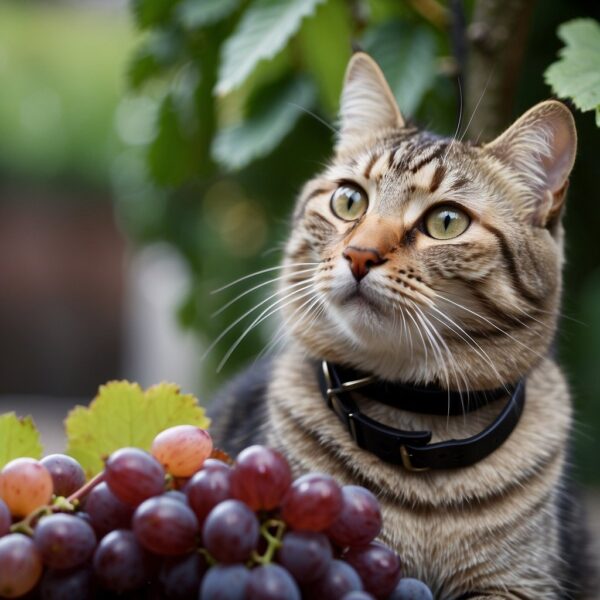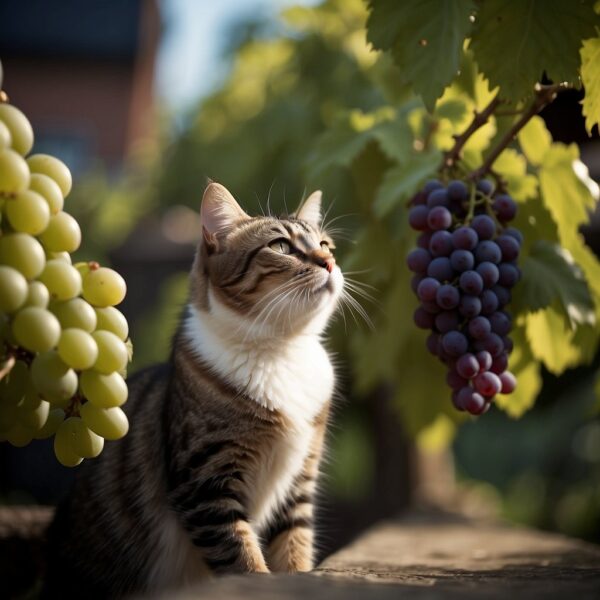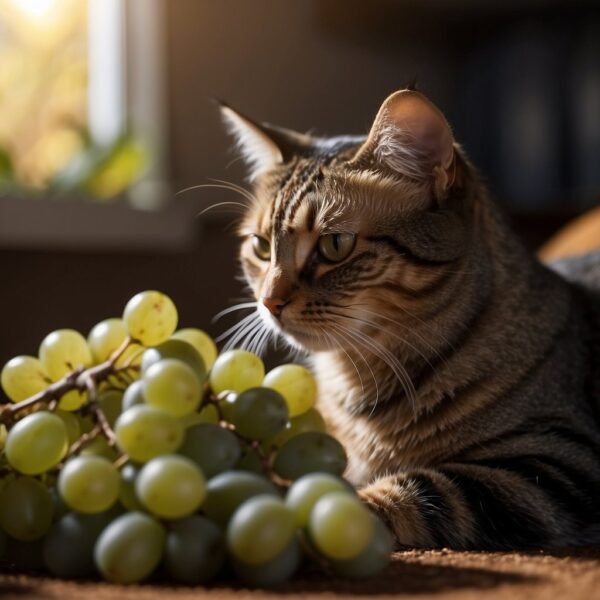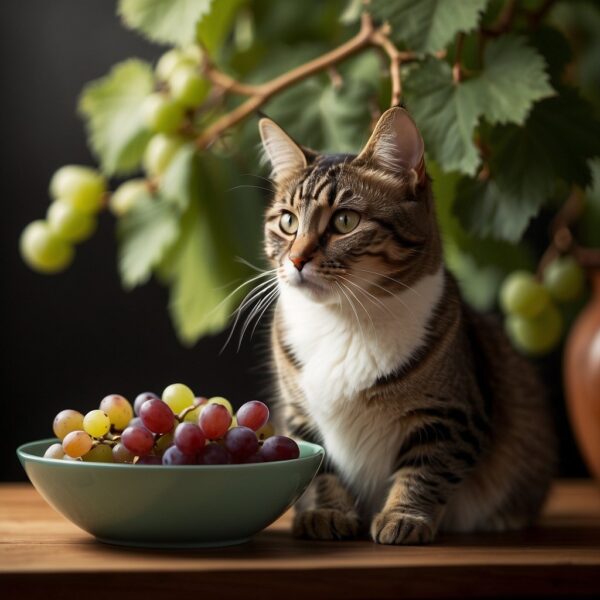
Grapes and Raisins are Toxic to Cats
Grapes might be a tasty treat for humans, but cats eating grapes presents an immediate danger to your cat. Although there might be a temptation to share this snack with your cat considering their curiosity and potential interest in human foods, doing so can pose serious health risks. It is critical to understand that what is nutritious for people is not always safe for cats. Grapes, along with raisins derived from them, have been consistently associated with toxic reactions in cats.
The ingestion of grapes has been known to potentially lead to acute kidney injury in cats, an issue of grave concern given the importance of kidney function to overall feline health. Symptoms showing a cat has consumed grapes may include vomiting, diarrhea, lethargy, and decreased appetite. Signs of distress should be taken seriously and prompt veterinary care is advised to prevent the condition from worsening. The specifics of grape and raisin toxicity are not fully understood, but the risk is well-recognized, leading to a strong veterinary consensus to prevent cats from consuming these fruits altogether.
Key Takeaways
- Grapes and raisins are confirmed to be toxic to cats.
- Symptoms of grape toxicity in cats can include vomiting, lethargy, and kidney issues.
- Veterinary help should be sought immediately if a cat has eaten grapes.
Grape Toxicity and Symptoms
Grape and raisin toxicity in cats is a serious concern, with ingestion potentially leading to acute kidney injury. This section will explore the symptoms of grape poisoning in cats, potential long-term health complications, and how toxicity levels compare with those in dogs.
Signs of Grape Poisoning in Cats
Cats that ingest grapes may exhibit various signs of toxicity. Early recognition of these symptoms is crucial:
- Vomiting and Diarrhea: The onset of these symptoms can often be rapid.
- Lethargy: Cats may appear unusually tired and uninterested in normal activities.
- Abdominal Pain: Discomfort can manifest as meowing, restlessness, or hiding.
- Decreased Appetite: Reluctance to eat is common.
- Increased Thirst and Urination: This sign may point to kidney issues.
- Weakness or Tremors: Impaired muscular coordination can be a critical symptom.
Long-Term Health Complications if cat eating grapes
Acute kidney failure is the most severe long-term health risk associated with grape toxicity in cats. Symptoms to monitor include:
- Dehydration: Can lead to further kidney complications if not treated promptly.
- Ongoing Gastrointestinal Issues: Persistent problems may occur, such as chronic stomach pain and nausea.
- Coma or Seizures: In extreme cases, neurological symptoms like seizures or coma could arise from severe toxicity.
Comparative Toxicity in Pets
While both dogs and cats can suffer from grape and raisin poisoning, each species can have different susceptibility levels:
- Dogs: Historically, more cases of poisoning have been reported in dogs, leading to better understanding and recognition.
- Cats: Grape toxicity is less common but can still be life-threatening with symptoms like rapid breathing, seizures, or coma.
It is essential for pet parents to be vigilant about keeping grapes and raisins away from their pets due to the potential for toxicosis and subsequent kidney damage.

Cat Eating Grapes: Immediate Actions and Treatment
Grapes and raisins are highly toxic to cats, with potential to cause acute kidney injury. Prompt and appropriate treatment is crucial to minimize the risk of severe health complications and to manage any discomfort your cat may experience.
What to Do if Your Cat Eats Grapes
If you suspect your cat has ingested grapes, it is vital to act immediately. Remove any remaining grapes from reach and observe your cat for signs of distress such as vomiting or lethargy. Contact your veterinarian or an emergency animal hospital right away to inform them of the situation and receive guidance on the next steps.
Veterinary Interventions
Upon arrival at the veterinary clinic, emergency care may involve inducing vomiting if the ingestion was recent. Activated charcoal may be administered to prevent further absorption of toxins. The veterinary team will likely perform blood work to assess the cat’s renal function and may administer IV fluids to prevent dehydration and support kidney function.
Preventing a cat from Accidentally Eating Grapes
To prevent accidental ingestion of grapes, store them where cats cannot reach. Keep grapes and similar toxic food items in closed containers inside the refrigerator or cabinets. Additionally, ensure all household members and visitors are aware that grapes are hazardous to cats.
Home Care and Monitoring
After initial treatment, continued home monitoring is essential. Watch for any changes in behavior, appetite, or water consumption, and check for signs of gastrointestinal upset. Keep your medicine cabinet secured to prevent your cat from accidentally accessing any medications that could cause further harm.
Understanding Treatment Options
Understanding the potential treatment options available can help in making informed decisions in an emergency. Treatments may vary based on the severity of the situation and can range from decontamination to supportive care for managing acute kidney injury. The costs associated with these treatments, such as vet bills, may also vary.
Recovery and Management
The goal of post-treatment is to return your feline friend to a healthy state. Nutrition, hydration, and comfort are important during recovery. Your vet may recommend a specific diet or additional medications to aid in healing. Monitoring your cat’s behavior and maintaining communication with the vet during this period will help manage any potential long-term effects.
These steps are crucial for ensuring the safety and well-being of your cat, minimizing the risk of serious health issues, and managing any necessary treatment for grape ingestion.

Understanding Feline Nutrition
When discussing feline nutrition, it is crucial to understand the species-specific dietary requirements of cats and the potential dangers posed by certain human foods, including grapes and raisins.
Carnivore Dietary Needs
Cats are obligate carnivores, meaning their nutrition must be predominantly based on animal tissue to meet their specific physiological needs. Their diet requires a high proportion of protein, essential amino acids like taurine, fatty acids, vitamins, and minerals, which are naturally obtained through the consumption of meat. Unlike omnivores, cats have a limited ability to digest plant-based substances and thus rely on specially formulated cat food that closely mimics their natural dietary patterns. Human foods, while sometimes offered as treats, are not a necessary part of a cat’s diet and can vary in safety.
In terms of safe treats, cats may have an occasional piece of cooked fish or meat, small portions of certain vegetables, and fruits like strawberries in moderation, provided they are not allergic. These should not replace their balanced cat food but can serve as an occasional healthy snack.
The Risks of cats eating Grapes and Raisins
Grapes and raisins are hazardous to cats; they can cause grape toxicity or grape poisoning, which can lead to acute kidney failure. Grape toxicity in cats does not have a known minimum safe dose, meaning even small amounts can be dangerous. The exact substance causing toxicity, such as tartaric acid or other compounds, has not been definitively identified. In addition to grapes and raisins, other foods poisonous to cats include chocolate, garlic, onions, and some dairy products like milk, which many adult cats cannot properly digest due to lactose intolerance.
While grapes might be a healthy snack for humans, their consumption can result in severe health implications for felines. If a cat ingests grapes or raisins, immediate veterinary attention is required. Prevention is the best approach, and cat owners must ensure these foods are kept out of reach from their pets.

cats eating grapes: Frequently Asked Questions
In this section, important questions about cat dietary practices are answered, providing clarity on what is safe and what should be avoided for feline consumption.
What fruits are safe for cats to consume?
Certain fruits like sliced apples (without seeds), bananas, and blueberries can be safe for cats in small quantities. These fruits should be given as an occasional treat and not a staple in their diet.
Which human foods are recommended for cats?
Cooked lean meats such as chicken, turkey, and lean beef are often recommended for cats. These should be prepared without any seasoning or sauces that could be harmful.
Are there any foods cats should absolutely avoid?
Cats should absolutely avoid chocolate, grapes, and raisins, as these can be highly toxic to them. Onions, garlic, and xylitol-containing products should also be kept out of reach.
Is it safe for cats to eat strawberries?
Cats can eat strawberries in moderation, although they do not offer any nutritional benefit to cats. Strawberries are non-toxic, but they should be given sparingly to prevent stomach upset.
What are the consequences if a cat eats a grape?
If a cat consumes grapes, it may experience vomiting, lethargy, or kidney damage, which can be life-threatening. Even small amounts can be toxic, so grapes should be avoided completely.
Can felines consume watermelon without health risks?
Cats can consume watermelon flesh in small amounts as it is non-toxic. However, seeds should be removed to prevent choking hazards, and it should only be given occasionally due to its high sugar content.